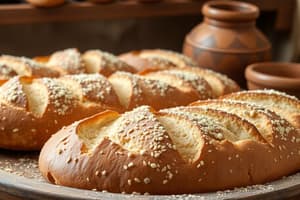Podcast
Questions and Answers
What significant milestone occurred during the time of Augustus and Julius Caesar regarding baking?
What significant milestone occurred during the time of Augustus and Julius Caesar regarding baking?
- The establishment of public bakeshops (correct)
- The first recorded recipe for bread
- The introduction of sugar in baking
- The invention of the closed oven
Which century saw the distinction between bakers and pastry makers become more evident?
Which century saw the distinction between bakers and pastry makers become more evident?
- 19th Century
- 18th Century (correct)
- 20th Century
- 17th Century
What is a bakery defined as?
What is a bakery defined as?
- A place where only cakes are sold
- An establishment that produces or sells only bread
- An establishment that produces or sells various baked goods (correct)
- A restaurant that serves baked items as the main course
Which ancient civilization is credited with the organization of wheat production for baking?
Which ancient civilization is credited with the organization of wheat production for baking?
What was a notable contribution of Procopio to the field of baking?
What was a notable contribution of Procopio to the field of baking?
Flashcards are hidden until you start studying
Study Notes
History of Baking
- Egyptians organized wheat production and baked bread in closed ovens, establishing early baking practices.
- Greeks created over 50 varieties of bread, further developing baking methods.
- Romans, under Augustus and Julius Caesar, established public bakeshops, solidifying baking as a profession.
- America's introduction of new ingredients, like sugar and cocoa, influenced baking innovations.
- Procopio opened the first ice cream parlor in Paris, marking a significant milestone in dessert preparation.
- The 18th century saw a clearer distinction between bakers and pastry makers.
- The first baking school was established in Paris in 1790.
Definition of Baking Terms
- Bakery: An establishment producing or selling various baked goods including bread, pastries, and cakes.
- Baking: Cooking food through dry heat in an oven, modifying starches and producing browning via caramelization of sugars.
- Baker: A professional who prepares baked goods.
- Pastry Chef: A cook specialized in making pastries, cakes, cookies, and desserts.
Characteristics of a Good Baker
- Strong passion and good leadership qualities.
- Proficient numerical and organizational skills.
- Creative, able to work well under pressure.
- Awareness of safety and hygiene rules.
- Capable of teamwork and possessing adequate physical fitness.
Changes During Baking
- Rapid chemical reactions occur in dough; baking powder and baking soda generate carbon dioxide when heated.
- Yeast fermentation in dough enhances flavor through a biological process.
Purpose of Baking
- Baking powder acts as a leavening agent, ensuring baked goods are light and fluffy.
- Specific cooking temperatures firm dough structures, achieving appropriate browning.
Advantages of Baking
- Produces a variety of appealing savory and sweet foods.
- Encourages sensory stimulation through mouth-watering aromas and visuals.
- Allows bulk cooking with consistent quality, utilizing effective oven controls.
- Provides a nurturing experience and joy for both the baker and consumers.
Disadvantages of Baking
- Requires regular attention to monitor baking processes and temperatures.
- Heating ovens can lead to high energy costs.
Aims and Objectives of Bakery
- Maintain high sanitation standards and foundation of baking methodology.
- Foster nutritional awareness and implement food principles for health.
- Plan products for profit and exhibit competency in baking and pastry techniques.
- Encourage clear communication, professionalism, and ethical standards.
Raw Materials in Baking
- Essential Ingredients:
- Flour, Sugar, Fat, Eggs, Yeast, Salt, Water.
- Optional Ingredients:
- Milk products, Dry fruits, Flavors, Chemicals, Spices, Chocolates, Cocoa powder, etc.
- Flour provides structure; liquids help form the structure and aid chemical reactions; eggs contribute richness and binding.
Principles of Baking
- Preheat ovens to the required temperatures for optimal baking.
- Accurate weighing of ingredients is crucial for consistency.
- Understanding ingredient functions enhances baking outcomes.
- Distribute foods evenly to promote uniform cooking.
- Position items appropriately within the oven; smaller items bake faster.
- Avoid mixing different items on the same tray for best results.
Studying That Suits You
Use AI to generate personalized quizzes and flashcards to suit your learning preferences.




